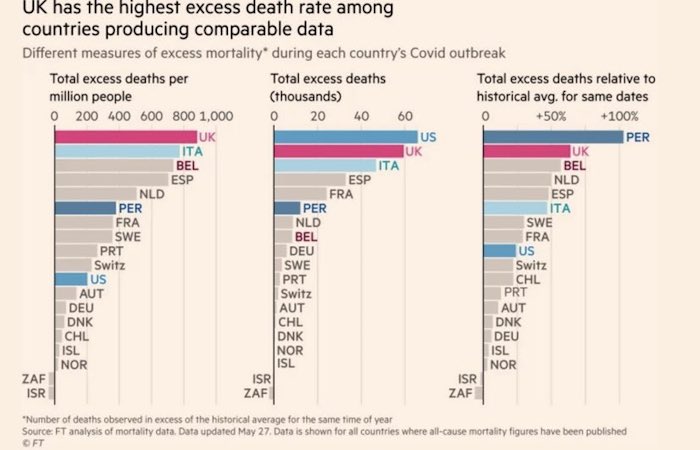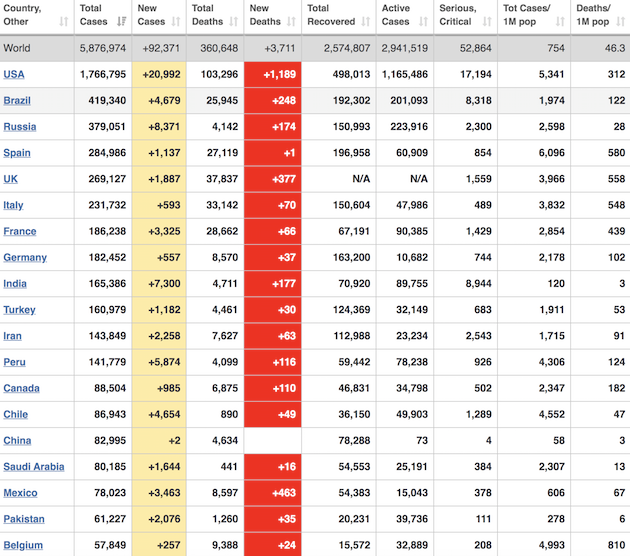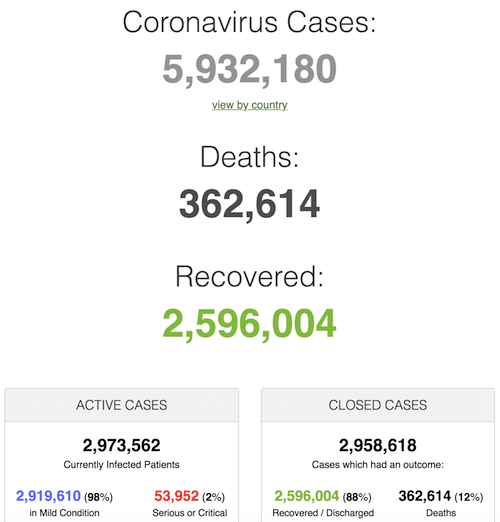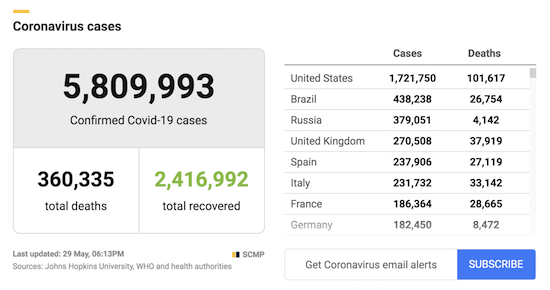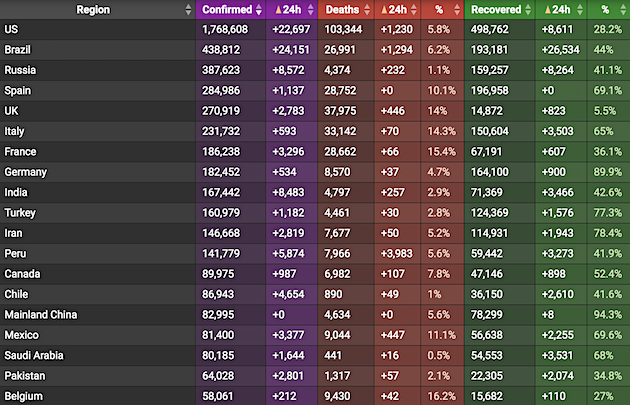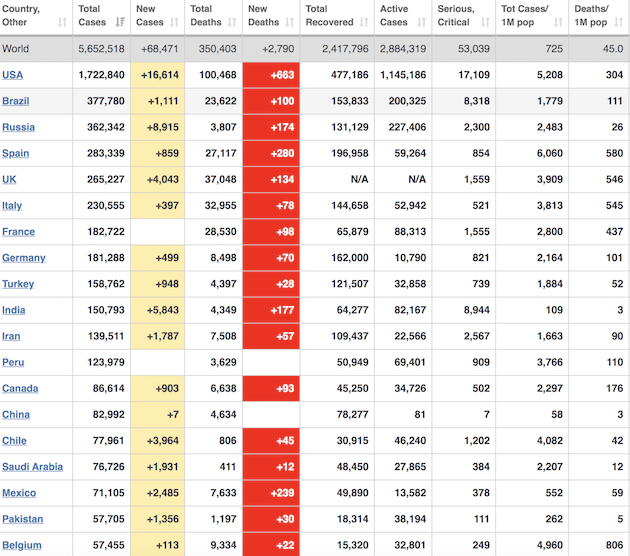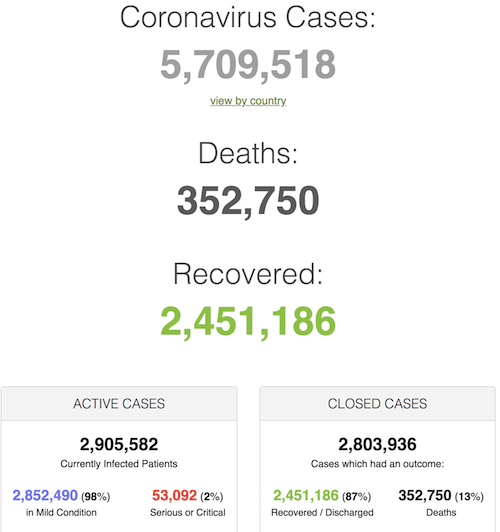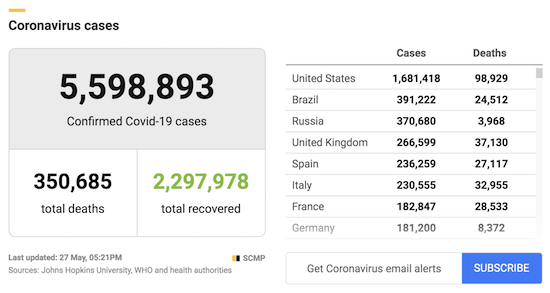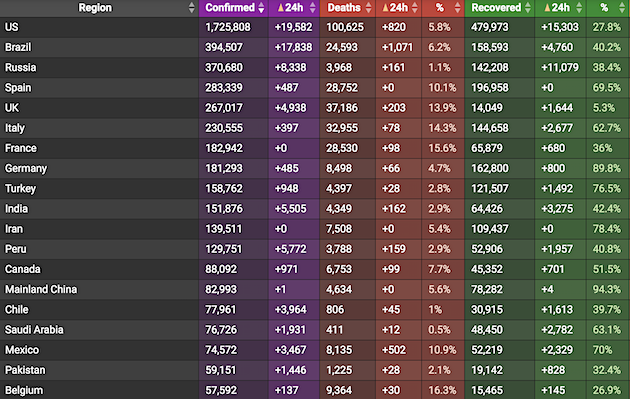
Harris&Ewing Protest: “Congressional Union for Woman Suffrage” 1916

Worldometer has global new cases for June 7 (midnight to midnight GMT+0) at + 113,090.
My count from about 6 am EDT to 6 am EDT is about + 108,198 cases. But it was Sunday yesterday, and Brazil ceased providing stats. Let’s see tomorrow.
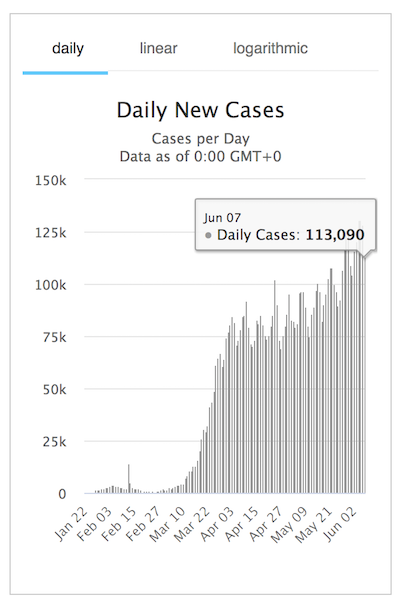

New cases past 24 hours in:
• US + 18,905
• Brazil + 18,375 (first day gov’t stats are unavailable)
• Russia + 8,985
• India + 11,412
• Pakistan + 4,728
• Chile + 6,405

• Cases 7,113,012 (+ 108,198 from yesterday’s 7,004,814)
• Deaths 406,549 (+ 3,884 from yesterday’s 402,665)

From Worldometer yesterday evening -before their day’s close-:
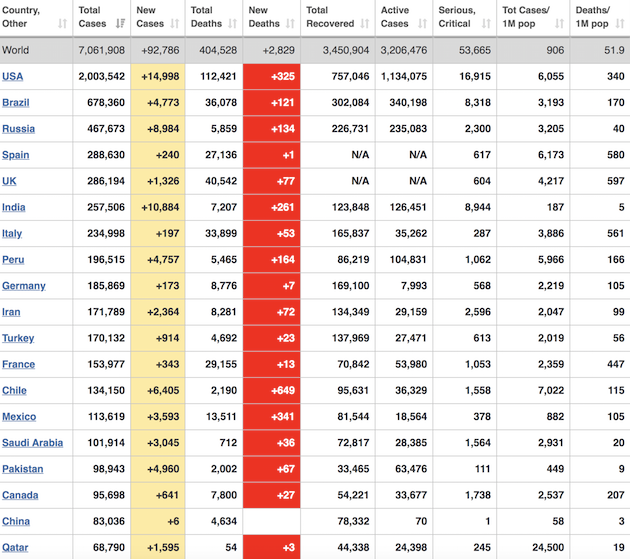
From Worldometer:
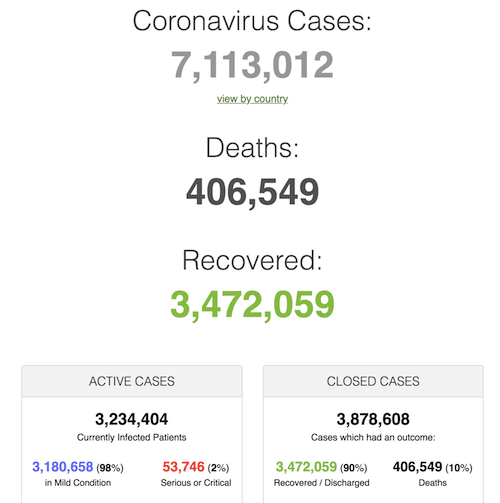
From COVID19Info.live: Note: COVID19Info global cases and deaths are now higher than Worldometer’s.
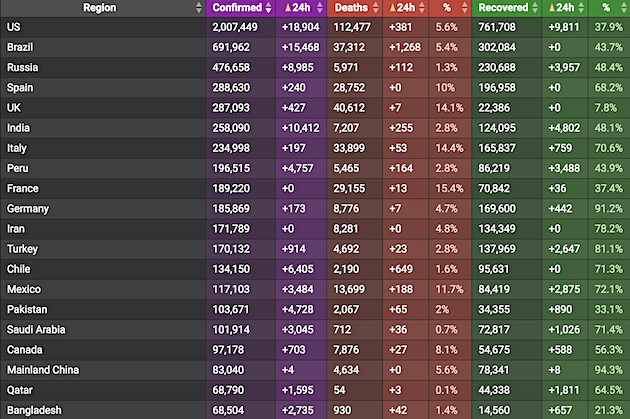

Friends, can someone check my logic Re: Masks?
Any error?
If so Masks could SOLVE the pandemic. I have been saying Masks are NECESSARY since Feb, didn't realize they could be SUFFICIENT! pic.twitter.com/2Gk8q3LPCb— Nassim Nicholas Taleb (@nntaleb) June 7, 2020
(plane is almost empty, so 2 surgical)
— Nassim Nicholas Taleb (@nntaleb) June 7, 2020
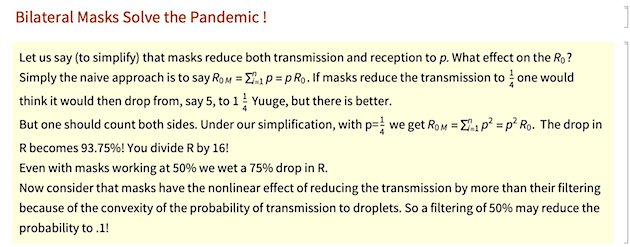

Of course congrats are in order. But also for New Zealand things are far from solved, it’s an isolated place now.
• New Zealand Has Eradicated Virus (AP)
Prime Minister Jacinda Ardern said Monday she was confident New Zealand has halted the spread of the coronavirus after the last known infected person in the country recovered. It has been 17 days since the last new case was reported, while 40,000 have been tested in that time. And Monday also marked the first time since late February that there have been no active cases. Ardern also announced the Cabinet had agreed to another phase of the country’s reopening, to take place at midnight. “We are confident we have eliminated transmission of the virus in New Zealand for now, but elimination is not a point in time, it is a sustained effort,” she said at a news conference.
“We almost certainly will see cases here again, and I do want to say again, we will almost certainly see cases here again, and that is not a sign that we have failed, it is a reality of this virus. But if and when that occurs we have to make sure and we are, that we are prepared.” She said her government’s focus will be on the country’s borders, where isolation and quarantine will continue. Experts say a number of factors have helped the nation of 5 million wipe out the disease. Its isolated location in the South Pacific gave it vital time to see how outbreaks spread in other countries, and Ardern acted decisively by imposing a strict lockdown early in the outbreak. Just over 1,500 people contracted the virus in New Zealand, including 22 who died.
https://twitter.com/farmgeek/status/1269804429693169664
And congrats for Thailand too:
https://twitter.com/RichardBarrow/status/1269853178318577664

Quite optimistic.
• 800-Day Plan: Air New Zealand Warns Of More Job Cuts, Less Flights (R.)
Air New Zealand will be nimbler, fly fewer passengers and routes, and may cut more jobs as it targets a return to “healthy profits” by 2022, its chief executive said as he navigates the airline through the coronavirus crisis. Greg Foran laid out an 800-day plan to customers and staff under which the national flag carrier will look at how to further cut labour costs, including leave without pay, reduced hours or possibly laying off more people. “We must first survive, then revive and finally thrive,” Foran said in an email to staff and customers, as he forecast revenue for the next financial year to more than halve from recent levels. Shares of the airline surged 11 per cent to NZ$1.82, its highest in almost three months.
Airlines have slashed thousands of jobs and set aside cash for impairments on aircraft as the coronavirus damaged demand amid global lockdowns. Even as countries re-open, profits may be threatened by people refraining from travel and lower fares due to discounts. The International Air Transport Association (IATA) said last week that global airlines cut domestic fares by an average 23 per cent in May, and previously warned traffic would not return to pre-crisis levels until at least 2023. Foran envisions Air New Zealand will be 70 per cent of its pre-COVID-19 size by August 2022 and hinted at further layoffs as the second phase of a cost-cutting plan, to save around $NZ150 million began.

Well, the richest ones, those that can afford to quarantine dozens of people.
• Film-Makers Back To Work In New Zealand After Coronavirus (R.)
New Zealand’s capital has had an extra buzz of excitement over the past week since Hollywood director James Cameron and his crew flew in to film the much-anticipated sequel of the epic science-fiction film “Avatar”.The film is among a handful of productions kicking off in New Zealand as it begins to open up after containing the novel coronavirus, and looks to its film industry to give its battered economy a boost. New Zealand’s borders remain closed to foreigners but the government gave special permission for the 55 crew members working on the “Avatar” sequel to jet in on a chartered plane. “Certainly, the fact that we are able to start earlier than some countries is great, much as it’s distressing to see that the pandemic is still such a challenge around the world,” said Annabelle Sheehan, chief executive of the New Zealand Film Commission.
New Zealand’s mountains, meadows and forests, made famous by “The Lord of the Rings” trilogy, have drawn several major film productions over recent years. About 47 productions were underway when Prime Minister Jacinda Ardern imposed a tough lockdown on March 26 to stop the spread of the coronavirus. It was a great success and the virus has been almost eliminated in New Zealand, which could be among the first countries in the world to return to normal this week, apart from the closed border. Avatar producer Jon Landau posted a picture of himself and director Cameron after landing last week and said they would self-isolate for 14 days in line with government rules.
“Your country has become a leader in how to deal with something like this, and I think films will want to come,” Landau told Radio New Zealand in an interview, referring to the coronavirus campaign. With people around the world cooped up at home, pressure is on film-makers and other content creators to make new material and get it out. But what’s holding them back is the lack of safe places to work, industry experts say. Now New Zealand is an option. “We’ve had a few international enquiries and that’s on the back of our COVID-free status,” said Gary Watkins, chief executive of Wellington-based Avalon Studios, which was used for the filming of the 2017 Scarlett Johansson starrer “Ghost in the Shell” and will also help with the new “Avatar”.
Economic Development Minister Phil Twyford defended the decision saying the border was only open to a few foreigners who were important for projects with significant economic value. New Zealand’s film industry is worth more than NZ$3 billion a year. A six-month international film can create an estimated 3,000 jobs. “You only need a few international people coming to trigger thousands of jobs,” said Sheehan. And New Zealand needs the jobs. The government expects hundreds of thousands to be lost because of the coronavirus.

Some people just don’t care about credibility, and neither does the Nobel committee. What utter nonsense.
• China Stats Accurate, Lockdown Makes Little Difference – Nobel Winner (RT)
Challenging the widespread belief that the worldwide anti-coronavirus lockdown has helped in slowing down the disease spread, Stanford Professor Michael Levitt said that it’s actually made very little difference. Speaking to RT’s Going Underground, Nobel Prize-winning biophysicist Levitt said that there was no reason to doubt China’s official coronavirus figures, since its statistics are corresponding with the dynamics observed elsewhere. “What happened in China outside of Hubei is exactly the same dynamics of the curve as what happened in New Zealand,” Levitt stated. “If China is forging statistics, they must have a time machine. And if they have the time machine, they would’ve beaten us in any competition anyway.”
The lockdown measures that have been implemented across many countries worldwide were actually not that effective, the scientist believes. The vast majority of the disease transmissions actually occurred before the lockdowns went into force – and in many countries the people were not that eager to abide by the rules, making the restrictions even more useless. Levitt believes that the best strategy for the government would have been focusing on protecting the elderly population and let others move freely.
“This virus really does seem to be limiting. It gets to about 500 to 1,000 fatalities per million people and then it stops. And this we’ve seen at so many places. I don’t think that Northern Italy practiced wonderful social distancing, I don’t think that social distancing was practiced wonderfully in New York City,” he said. What happened is that the virus is most infectious and most dangerous before you actually know it’s there. Sweden, for instance, which has been harshly criticized for its laissez-faire approach to the pandemic, remains within the European averages – and even falls behind the worst-hit nations, such as Belgium and the UK. “Sweden has had a much milder lockdown than anybody. The predicted number for Sweden was around 60,000 [deaths]. Sweden looks like it’s going to stop at 6,000 at the most,” Levitt said.

This one is for the Automatic Earth’s resident physician Dr. John Day in Texas.
“74,978 Texans tested positive for the coronavirus as of June 7 — 1,425 more than the day before and 10,691 more than a week ago.”
• Coronavirus in Texas: Cases, Deaths and Tests (TT)
Gov. Greg Abbott is looking at two specific metrics to justify his decision to restart the Texas economy — the positive test rate and hospitalization levels. Here’s how the numbers changed in the first two weeks of May when Texas began reopening. On March 4, DSHS reported Texas’ first positive case of the coronavirus, in Fort Bend County. The patient had recently traveled abroad. A month later on April 4, there were 6,110 cases in 151 counties. As of June 7, there are 74,978 cases in 235 counties. The Tribune is measuring both the number of cases in each county and the rate of cases per 1,000 residents.
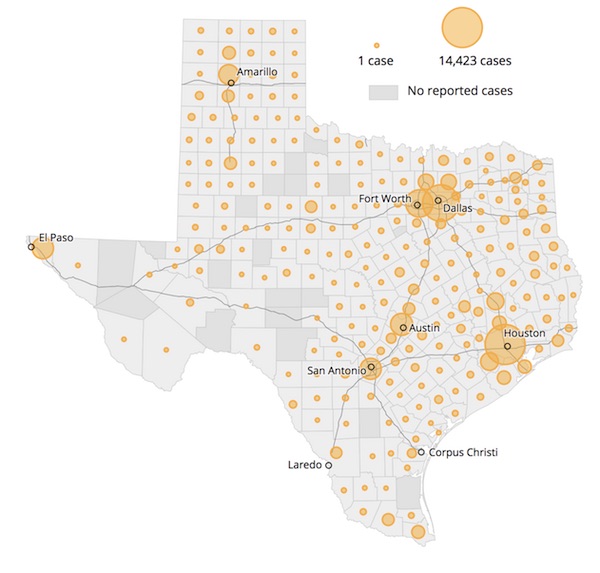
The rate of cases per 1,000 residents is especially high in the panhandle’s Moore County, where infections are tied to a meatpacking plant. The rate of cases is also high in counties with state prisons such as Walker and Jones. In other rural areas where the presence of the virus has yet to be confirmed, testing has been scarce.
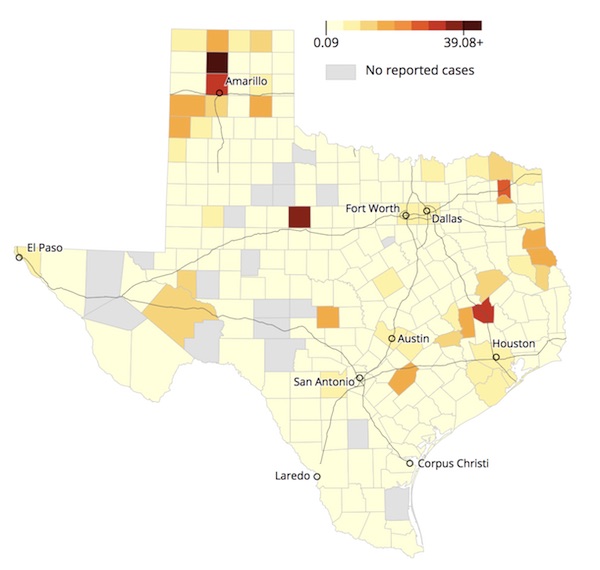
On April 6, the state started reporting the number of patients with positive tests who are hospitalized. It was 1,153 that day and 1,878 on June 7. This data does not account for people who are hospitalized but have not gotten a positive test. As of mid-April, concerns that Texas hospitals would be unable to accommodate a surge of COVID-19 patients seem to have been assuaged. As he makes decisions about how quickly to restart the Texas economy, Abbott says he is watching the number of hospitalizations and the hospitalization rate — the proportion of infected Texans who require hospitalization. [..] The first death linked to the coronavirus in Texas occurred March 16 in Matagorda County. As of June 7, 1,830 people who tested positive for the virus have died.
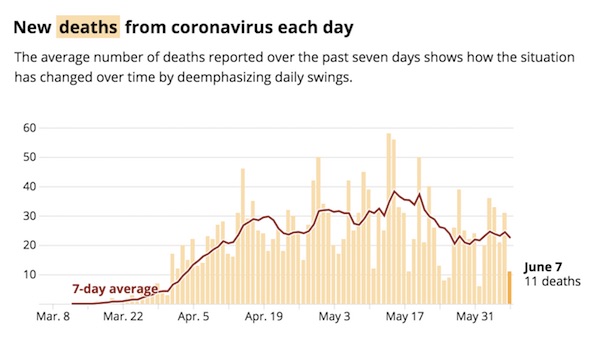
Daily infection rateGov. Greg Abbott said he is watching the state’s infection rate — the percentage of positive cases to tests conducted. The average daily infection rate is calculated by dividing the 7-day average of positive cases by the 7-day average of tests conducted. This shows how the situation has changed over time by de-emphasizing daily swings. Public health experts want the daily infection rate to remain below 6%.
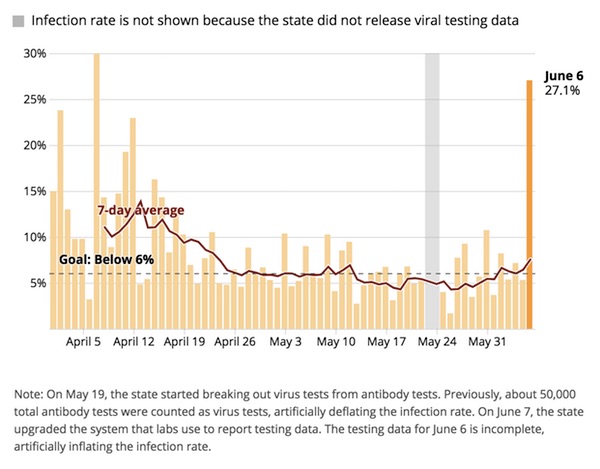
And while you're watching AZ … keep an eye on Utah and North Carolina, they are spiking too. Probably not far behind AZ in running out of hospital beds. https://t.co/H7SmqhybaQ pic.twitter.com/7UTDM6kYDU
— Jim Bianco (@biancoresearch) June 8, 2020

Makes you wonder how many are on his staff.
• Guatemala President To Work Remotely After 18 Staff Get Coronavirus (R.)
Guatemalan President Alejandro Giammattei said on Sunday that 18 employees at his office and on his security detail have tested positive for the novel coronavirus, so he will work remotely and the presidential offices will be disinfected. “I and the vice president will carry out our activities remotely. We’re healthy. We’ve been tested. We don’t have coronavirus,” Giammattei said in a televised address. The Central American country has registered 7,055 confirmed cases of coronavirus and 252 fatalities from the pandemic.

“An estimated $7.4 billion in rent for April hasn’t been paid (May numbers have yet to be released), or about 45% of what’s owed..”
• US Bankruptcies Soar 48% In May (ZH)
One month ago, when showing the uncanny correlation between defaults and the unemployment rates, we predicted that the number of Chapter 11 filings that is about to flood the US will be nothing short of biblical. All that was missing was a catalyst, one which according to Bloomberg arrived in late May as retail landlords started sending out thousands of default notices to tenants, who in turn experienced a collapse in foot traffic, sales and cash flow due to the COVID-19 pandemic, and were simply unable to pay their debt obligations. According to Bloomberg, restaurants, department stores, apparel merchants and specialty chains have been receiving notices from landlords – some of whom have gone as long as three months without receiving rent.
“The default letters from landlords are flying out the door,” said Andy Graiser, co-president of commercial real estate company, A&G Real Estate Partners. “It’s creating a real fear in the marketplace.” Pressure from default notices and follow-up actions like locking up stores or terminating leases was cited in the bankruptcies of Modell’s Sporting Goods and Stage Stores Inc. Many chains stopped paying rent after the pandemic shuttered most U.S. stores, gambling that they could hold on to some cash before landlords demanded payment. An estimated $7.4 billion in rent for April hasn’t been paid (May numbers have yet to be released), or about 45% of what’s owed, according to a recent analysis by CoStar Group, which also found that just a quarter of expected rent payments have been received by landlords.
“If the landlords don’t put a pause on their actions, you’re going to see more bankruptcies.” Last Thursday, these anecdotal reports were confirmed by the American Bankruptcy Institute which announced that as expected, corporate bankruptcies soared during May, pushing the number of filings to levels recorded in the wake of the 2007-09 recession. According to figures from legal-services firm Epiq Global, US bankruptcy courts recorded 722 businesses nationwide filing for chapter 11 protection last month, a yearly increase of 48% from 487 businesses in May of 2019. The surge was also seen on a month-over-month basis, which jumped by 28% from the 562 Chapter 11 filings in April.
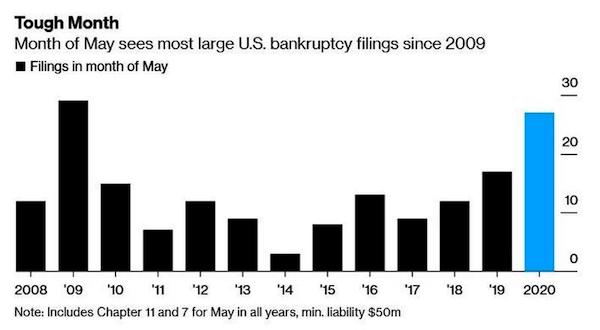

In the same way that they all paint themselves green.
• Major Corporations Scramble To Support Black Lives Matter (JTN)
As protests and demonstrations against racism and police brutality drag on for another week across America, numerous corporations are scrambling to capitalize on the moment by donating to various Black Lives Matter organizations and allied causes, winning praise and sometimes sharp criticism for P.R. efforts that are by turns successfully deft and sometimes unfortunately clumsy. Corporations today appear to be keenly aware of the marketing benefits to striking that balance, which is likely why so many of them are hastily jumping on board with the current Black Lives Matter craze — some with success, others with more difficulty.
Uber Eats, the food delivery app of the rideshare company Uber, announced this week that black-owned businesses would have free delivery privileges on its system. Uber is suspending delivery fees for black-owned restaurants through the end of the year, the company said in a statement, and will also offer discounted rides to those who own and work at black-owned small businesses. Uber’s announcement was perfectly timed for both the political climate and the economic one: Most restaurants have been surviving on takeout alone over the last few months of coronavirus lockdowns, and owners are still depending heavily on takeaway business as reopenings progress slowly across the country.
Other companies have pledged substantial monetary donations for progressive and racially conscious causes. YouTube this week announced a $1 million donation “to address social injustice.” The company was not clear to what causes exactly it would be donating that money, the sum of which accounts for about 0.006% of the company’s yearly revenue of $15 billion. The clothing company Spanx, meanwhile — known for its undergarments that men and women wear to appear thinner — said in an Instagram post this week that it would be donating “$100,000 across national organizations focused on combating racial injustice: Black Lives Matter, NAACP Legal Defense and Education Fund and The Minnesota Freedom Fund.”
[..] It is not immediately evident what it means exactly to donate to “Black Lives Matter,” a mostly loosely organized movement of disassociated activists and protesters across the country and the world. The campaign’s nominal central authority does accept donations, though it is not evident how those funds are dispensed. The companies Ganni, Anastasia Beverly Hills, Pretty Little Thing and others all pledged to donate to Black Lives Matter, among other causes.

I sort of see why they would do it, I can even see a few ways that might make it work, but a lot more ways that won’t. And if the council president says: “Our efforts at incremental reform have failed, period.”, shouldn’t the council perhaps disband itself also?
• Minneapolis City Council Votes To Disband Police Force (AP)
A majority of the members of the Minneapolis City Council said Sunday they support disbanding the city’s police department, an aggressive stance that comes just as the state has launched a civil rights investigation after George Floyd’s death. Nine of the council’s 12 members appeared with activists at a rally in a city park Sunday afternoon and vowed to end policing as the city currently knows it. Council member Jeremiah Ellison promised that the council would “dismantle” the department. “It is clear that our system of policing is not keeping our communities safe,” Lisa Bender, the council president, said. “Our efforts at incremental reform have failed, period.” Bender went on to say she and the eight other council members that joined the rally are committed to ending the city’s relationship with the police force and “to end policing as we know it and recreate systems that actually keep us safe.”
[..] Community activists have criticized the Minneapolis department for years for what they say is a racist and brutal culture that resists change. The state of Minnesota launched a civil rights investigation of the department last week, and the first concrete changes came Friday in a stipulated agreement in which the city agreed to ban chokeholds and neck restraints. A more complete remaking of the department is likely to unfold in coming months. Disbanding an entire department has happened before. In 2012, with crime rampant in Camden, New Jersey, the city disbanded its police department and replaced it with a new force that covered Camden County.
The last person to disband the police was Sting.
— God (@TheTweetOfGod) June 7, 2020

“57 officers did *not* resign in solidarity with the officers who pushed over a 75-year-old causing brain injury. This turns out to be a lie from the police union.”
“We quit because our union said [they] aren’t legally backing us anymore. So why would we stand on a line for the City with no legal backing if something [were to] happen?”
• Buffalo Police ERT Members Say Resignation Was Not In Solidarity (WKBW)
“It went bad. It went bad.” Two officers of the Buffalo Police Department’s Emergency Response Team spoke with 7 Eyewitness News under the condition their names not be used. The officers are part of the 57-person volunteer assignment team that resigned Friday, following an incident involving two of their members Thursday night in Niagara Square. They did not resign from the police department, only from their roles on the team. The officers we spoke with said the Buffalo Police Benevolent Association’s statement asserting all 57 officers resigned from ERT in a “show of support” with the two officers that were suspended without pay is not true.
“I don’t understand why the union said it’s a thing of solidarity. I think it sends the wrong message that ‘we’re backing our own’ and that’s not the case,” said one officer with whom we spoke. “We quit because our union said [they] aren’t legally backing us anymore. So why would we stand on a line for the City with no legal backing if something [were to] happen? Has nothing to do with us supporting,” said another. A representative from the Buffalo Police Benevolent Association told 7 Eyewitness News Reporter Hannah Buehler the officers resigned in “disgust” with how the two officers were treated. “Some of them probably resigned because they support the officer,” said another officer with whom we spoke. “But, for many of us, that’s not true.”
“The City, DA Flynn, they’re not representing those guys at all. They have to find their own lawyers, they have to come out of pocket.” 7 Eyewitness News was not able to reach PBA president John Evans to confirm this information or get a response to several officers shooting down his assertions, but we did obtain an email sent to PBA members by Evans. It states, in part: “In light of this, in order to maintain the sound financial structure of the PBA it will be my opinion the PBA NOT to pay for any ERT or SWAT members legal defense related to these protests going forward. This Admin in conjunction with DA John Flynn and or JP Kennedy could put a serious dent in the PBA’s funds.”

Things are going to change one way or another.
• NYPD, City Hall Deny Police Brass Shake-Up (Pix11)
Text messages and Facebook posts went into overdrive Sunday in New York’s law enforcement community, with claims top leaders in the NYPD were either resigning or being asked to leave, with replacements ready to step in. “This is not true,” tweeted Freddi Goldstein, press secretary to Mayor Bill de Blasio. NYPD Deputy Commissioner Richard Esposito, over the phone, also said it wasn’t true. But we’re learning there are tensions behind the scenes about the specific fate of two police officers involved in confrontations with protesters in the last twelve days. Both of the cops were suspended without pay on Friday. One of them allegedly knocked down a female protester, Dounya Zayer, outside the Barclays Center in Brooklyn in the early days of the George Floyd protests.
Zayer said she suffered seizures, as a result. Another cop was seen on video pulling down the mask of a male demonstrator and spraying the man’s face with pepper spray. Multiple sources said there’s anger among the rank and file—and among some of the NYPD brass—about the Brooklyn District Attorney’s office considering criminal charges against the two officers. When PIX11 called a spokesman for the Brooklyn DA’s office Sunday evening, we were told, “We’re investigating both of these cases. It’s not true both are going to be arrested imminently. It might happen in the future.” The NYPD has dealt with a lot of turmoil in the last two weeks. “This is all about pandering to anti-cop sentiment,” said a former NYPD Deputy Commissioner.
Multiple police officers have been under siege during the protests, trying to fend off looters, brick and bottle throwers and the burning of NYPD vehicles. Officer Yayon Jean Pierre was stabbed in the neck last week while working an anti-looting post, and two other cops were shot in the hand. Several other officers have been hit by cars, one of them hurt seriously. Sergeant’s Benevolent Association President Ed Mullins, said his phone was exploding with calls about behind-the-scenes clashes between the NYPD and City Hall. “The losers in this are not going to be the cops,” Mullins said. “It’s going to be the public.” Mullins said he didn’t believe the protests were continuing because of the NYPD. “I think it’s about overthrowing the presidency,” he said.

Again: storm warning. The “left” will try and label it all political. But if that fails, where are they?
• 33 Russia Collusion Probe Witnesses The Senate Could Subpoena (Solomon)
Senate Homeland Security and Governmental Affairs Chairman Ron Johnson, Wis., now has the authority to subpoena the agencies and individuals he wants to interrogate or to turn over documents. Senate Judiciary Committee Chairman Lindsey Graham hopes to get his subpoena power this week. [..] The scope of the subpoenas suggests a far-reaching inquiry. For instance, the FBI will be asked to surrender “all records related to the Crossfire Hurricane investigation. This includes, but is not limited to, all records provided or made available to the Inspector General of the U.S. Department of Justice for its review that resulted in the report ‘Review of Four FISA Applications and Other Aspects of the FBI’s Crossfire Hurricane Investigation’; and all records related to requests to the General Services Administration (GSA) or Office of the Inspector General of GSA for presidential transition records from November 2016 through December 2017.”
The State Department will be asked to produce records of its contacts with Christopher Steele, the former MI6 operative who penned the unverified dossier that was used by the bureau as essential evidence in pursuing the case. And the DNI will be asked for all records related to the Obama administration’s unmasking of Trump campaign and transition figures in intelligence intercepts. The list of individuals that Johnson’s committee is seeking to question or seek documents from includes some familiar figures in the controversy, like fired FBI Director James Comey, ex-FBI Counsel James Baker, fired FBI Special Agent Peter Strzok and his paramour, the former FBI lawyer Lisa Page, Obama Director of National Intelligence James Clapper, former CIA Director John Brennan and former Obama National Security Adviser Susan Rice, whose final email on the day she left office about President Obama’s dealings in the Russia probe has stoked great intrigue.
Senate investigators plan to delve into discrepancies in stories between Comey and Brennan over the intelligence community assessment that Russia tried to help Trump win the 2016 election and Comey and Clapper over who briefed President Obama in early January 2017 about a sensitive intercept of a conversation between incoming Trump National Security Adviser Michael Flynn and the Russian ambassador to Washington. One of the most anticipated witnesses is Bill Priestap, the former FBI assistant director of counterintelligence, who supervised Strzok’s Russia investigation and interacted often with former FBI deputy director Andrew McCabe.
Did you know that in addition to being the President of Russia, Vladimir V. Putin is also a computer wizard who can personally "hack the vote" in the upcoming Presidential Election? That's what I'm learning in the @nytimes: https://t.co/iSqVMWIhG1 pic.twitter.com/DiMKTHMsmj
— Aaron Maté (@aaronjmate) June 8, 2020
The NYT literally fired their editorial page editor because he dared publish an op-ed that Leftists disagreed with.
The totalitarian Left will brook no dissent. To hell with Free Speech—we are Pravda.
New York Times: founded as an actual newspaper 9/18/1851.
Died: 6/7/2020. https://t.co/YIzBihdhtO
— Ted Cruz (@tedcruz) June 8, 2020

In other words: half the country are deplorables. Same issue, same question she asked in 2016. Never learned a single thing.
• Hillary: How Can Anybody With Beating Heart, Working Mind Support Trump? (Ind.)
Former Secretary of State Hillary Clinton spoke out about her 2016 presidential rival Donald Trump, calling his time in office a “failure” and questioning how anyone could continue to support him. Speaking to the Los Angeles Times, Ms Clinton lashed out at President Donald Trump, criticising his leadership and characterising him as uncaring and incompetent. “What has been so surprising to me is how he can barely make an effort to rise to the occasion. I truly don’t think he can get out of his own way. Everything always has to be about him,” Ms Clinton said. She said Mr Trump tried to ignore the coronavirus pandemic until he was forced to address it, after which she claims he tried to turn the pandemic response into a “daily rally.”
Regarding the murder of George Floyd and the subsequent protests against police brutality and systemic racism in the US, Ms Clinton suggested she had initially hoped that Mr Trump was going to respond with empathy, but that it quickly became clear that wasn’t going to be the case. “He doesn’t have even the minor amount of empathy to fake it, to look like he is concerned, and he reverts to the belligerence and the threat-making and the photo-opping, all the tried and true tactics that feed his need for control and dominance and attention,” Ms Clinton said. Of Mr Trump’s “photo-opping,” his appearance at St John’s Church near the White House – and the tear gassing of protesters to clear the path for the president – has become one of the many flashpoints in the George Floyd protests.
“It was beyond my comprehension. We have never seen anything like this,” she said. “He is without shame. It is a mystery why anybody with a beating heart and a working mind still supports him.” She said that despite the fact that Mr Trump’s character was apparent during the election, even she wasn’t prepared for the degree to which the president would shuck norms. “So much of what we’re seeing now, sadly, was known about Trump and the kind of people who were loyal to him. But it turned out to be even worse than what I thought it would be,” she said. “Despite having my own front-row seat and being concerned about his character and behaviour, he has gone further and broken more norms and undermined our institutions more deeply than I thought would have been possible in such a short period of time.”
No, no problem, that would be great!!!@GenFlynn @JosephJFlynn1 @BarbaraRedgate @GoJackFlynn @SidneyPowell1 https://t.co/bPkOKUKvu8
— MaryFlynnONeill⭐️⭐️⭐️ (@flynn_neill) June 8, 2020
New Lincoln Project ad:
“All of the architects of the Iraq War think Donald Trump is unfit for office”
— Greg Price (@greg_price11) June 7, 2020
If that is true then why was the scope memo created in August of 2017 to look for Russian collusion from Carter Page, George Papadopoulos and Paul Manafort? pic.twitter.com/bU31wpjrfh
— CrossFireJazz (@ZZZJazzy) June 7, 2020

Jordan hasn’t had the best of times either.
• Rep. Jordan: Not Surprising McCabe, Rosenstein Disagree
It’s not surprising that former FBI Director Andrew McCabe and ex-Deputy Attorney General Rod Rosenstein disagree about the events surrounding the Russia probe, Rep. Jim Jordan said Thursday. “Somebody is not telling the truth because former FBI counsel Jim Baker told us when we deposed him last Congress, in the Judiciary Committee, that Rod Rosenstein was serious about wearing a wire and using the 25th Amendment to try to remove President [Donald] Trump from office,” the Ohio Republican told Fox News’ “Fox and Friends.” “Somebody is not being square and I guess maybe when you are engaged in this kind of wrongdoing which happened at the upper levels of the FBI, maybe it’s tough to keep your story straight.”
McCabe on Wednesday accused Rosenstein of lying about ex-FBI Director James Comey’s memos about his meetings with Trump. Rosenstein testified to the Senate Judiciary Committee that McCabe should have told him sooner about the Comey documents, reports Fox News. “Mr. Rosenstein’s claims to have been misled by me, or anyone from the FBI, regarding our concerns about President Trump and the Trump campaign’s interactions with Russia are completely false,” McCabe said in a statement Wednesday. Rosenstein signed the Foreign Intelligence Surveillance Act application to surveil former Trump campaign aide Carter Page, named Bob Mueller as special counsel, and broadened the scope of the Russia investigation, Jordan pointed out.
“The guy who did all of that now says there wasn’t anything there,” said Jordan. “That’s what we have been saying for three years … yet Rosenstein names Bob Mueller as a special counsel and puts our country three years of what we went through. That’s why people are upset about this and that’s why we have got to get to the bottom of it all.”
Colin Powell, who lied to the entire world about WMDs in Iraq, paving the way for an illegal war that killed and displaced millions of innocents, gave rise to ISIS, and destabilized the Middle East, is actually out here today lecturing us about lies. https://t.co/qDNyZK1Lrx
— Sarah Abdallah (@sahouraxo) June 7, 2020

Intriguing. Made me think of Einstein love of simplicity.
Diluting the blood of mice with saline/albumin rejuvenates them.
Original paper: Rejuvenation of three germ layers tissues by exchanging old blood plasma with saline-albumin
• Out With the Old Blood (Mitteldorf)
There is great promise in 2020 that we might be able to make our bodies young without having to explicitly repair molecular damage, but just by changing the signaling environment. Do we need to add signals that say “young” or remove signals that say “old”? Does infusion of biochemical signals from young blood plasma rejuvenate tissues of an old animal? Or are there dissolved signal proteins in old animals that must be removed? For a decade, Irena and Mike Conboy have been telling us removal of bad actors is more important. But just last month, Harold Katcher reported spectacular success by infusing a plasma fraction while taking away nothing. Then, last week, the Conboys came back with a demonstration of the rejuvenating power of simple dilution.
They simply replaced half of the blood plasma in 2-year-old mice with a saline solution containing 5% albumin. What is albumin? Blood plasma is chock full of dissolved proteins, about 10% by weight. About half of these are termed albumin. Albumin is the generic portion. It doesn’t change through the lifetime. It doesn’t carry information by itself. But albumin transports nutrients and minerals through the body. The Conboys took care to show that albumin has no rejuvenation power on its own, and had nothing to do with their experimental results. Rather, they had to replenish albumin in diluting blood, because the animals would be sickened if half their albumin were removed. Replacing the albumin in a transfusion is akin to replacing the volume of water or maintaining the salinity.
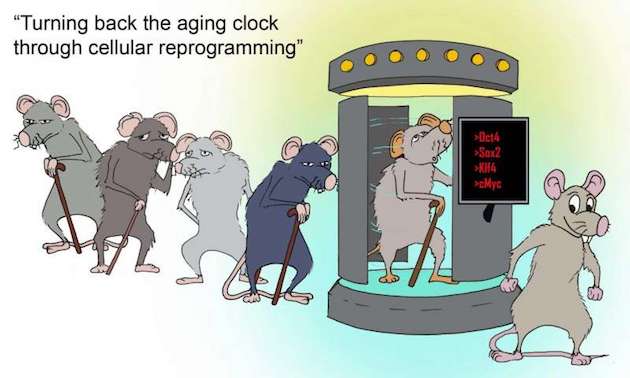
In preparation for this experiment, the Conboys have invested years in miniaturizing the technology for blood transfusions, so that mice can be subjected to the same procedures that are commonplace in human hospitals. The Conboy lab replaced 50% of mouse blood plasma. They got spectacular results with a single treatment, based on a lucky guess. They have not yet experimented with 30% or 70%. They don’t know yet how long the treatment will last and how long it needs to be repeated. As with previous papers from the Conboy lab, the group focused on repair and stem cell activity as evidence of a more youthful state. Three separate tissue samples were taken from liver, muscle, and brain. “Muscle repair was improved, fibrosis was attenuated, and inhibition of myogenic proliferation was switched to enhancement; liver adiposity and fibrosis were reduced; and hippocampal neurogenesis was increased.”

We try to run the Automatic Earth on people’s kind donations. Since their revenue has collapsed, ads no longer pay for all you read, and your support is now an integral part of the interaction.
Thank you.

Fact: Huawei is 99% owned by the Huawei Investment Holdings Trade Union Committee with less than 500 employees (not Huawei Technologies) which is under the umbrella of the All China Federation Trade Union headed by a Xi loyalist who cleaned up Sichuan and Chengdu after Bo Xilai https://t.co/tfJ84ZiRLX
— Cartogropher Balding 大老板 (@BaldingsWorld) June 8, 2020

ICYMI: A Siberian zoo that closed its doors to visitors for over two months says the lockdown has encouraged a baby boom among its animals https://t.co/VpfesKNtZN pic.twitter.com/CCnuPthZ1z
— Reuters (@Reuters) June 8, 2020

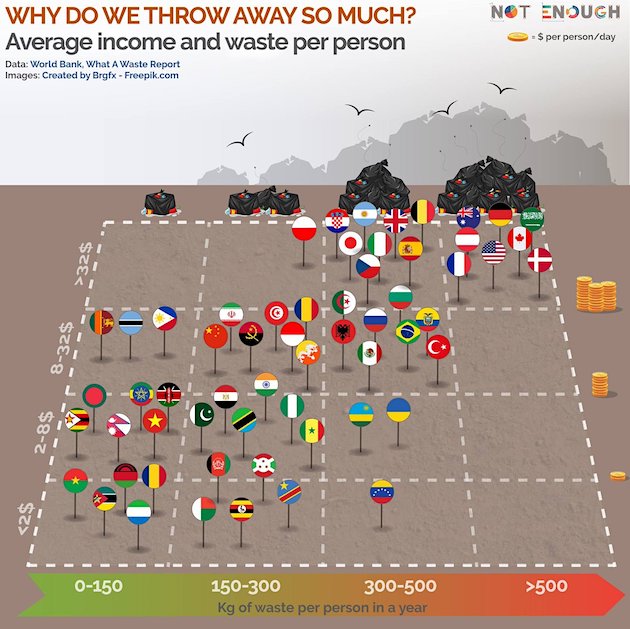

Elmer Fudd has singlehandedly solved the US gun problem:


Support the Automatic Earth in virustime.



